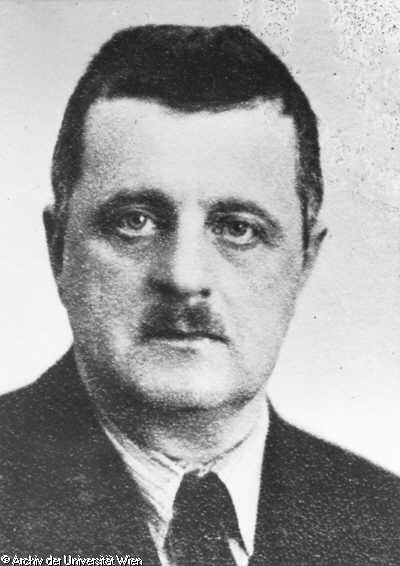
| Born: | 03-31-1882 |
| Faculty: | Philosophical School |
| Category: | Expelled teacher |
August von LOEHR (born on March 31st, 1882 in Vienna, died on September 11th, 1965 in Vienna) was Hononorary Professor for Numismatic ("Muenzkunde und Geldgeschichte des Mittelalters und der Neuzeit") at the Philosophical School of the University of Vienna in 1938.
He was persecuted in times of Nazism because of his political orientation, lost his position and was forved to leave the university in 1938. He returned to Austria in 1946 and became honorary professor at the University of Vienna.
Loehr, the son of the director of the Nordbahn (the Northern railway), attended the secondary school of the Benedictine monastery in Seitenstetten in Lower Austria[1] and then studied at the universities of Vienna, Heidelberg and Grenoble, [2] to obtain his doctorate in 1905 in Vienna "sub auspiciis imperatoris" (an especially distinguished form of graduation). In 1911 he also became doctor of jurisprudence. He attended the Institut für österreichische Geschichtsforschung (Institute for Austrian History Research) from 1903 until 1905 and after graduating became a member of the Austrian Institute in Rome in 1905/06. In 1906 he joined the imperial Muenzkabinett (numismatic collection), where he first advanced to the position of assistant in 1907, and then moved on to become the head of the department for the Middle Ages and the modern era after Karl Domanig’s death in 1913. In 1926 he became the director of the Muenzkabinett, and took up an honorary professorship for numismatics and numismatic history at the University of Vienna three years later.
His work as director of the Muenzkabinett and his honorary professorship at the University of Vienna ended with Austria’s "Anschluss" to the German Reich. [3] After being forced into retirement from his position as director, he gave up his professorship at the university - by demand of the dean’s office - in April 1938. [4] He also had to resign from his membership at the Academy of Sciences. There is no mention of Loehr having other occupations during the Nazi era.
After the end of the war he became the first director of the Kunsthistorisches Museum (museum of fine arts) and was substantially involved in the founding of the "Museum österreichischer Kultur" (museum of Austrian culture). [5] Meanwhile, nothing stood in the way of his return to the University of Vienna anymore, and the ministry reinstated his teaching license in 1945, [6] which - on Loehr’s behest - was expanded to the field of general museology. [7] During the phase of reconstruction and the suspension of Leo Santifaller, Loehr also acted as the temporary head of the Historisches Seminar (Historical Seminar) and the Institut für oesterreichische Geschichtsforschung.[8]
In 1949, finally, he was appointed the first general manager of the cultural history collections. His career in the Second Republic is also evidenced by other offices Loehr held: He was, for example, advisor for numismatics, museology and economic-historical monuments worthy of protection at the Denkmalschutz (department for the protection of historical buildings and monuments). In 1949 he was involved in the foundation of the Verband oesterreichischer Geschichtsvereine (Association of Austrian Historical Societies), where he also became an honorary member in 1956 and honorary president in 1961. Here he also founded the "Mitteilungs-Blatt der Museen Oesterreichs" (newsletter of Austrian museums). Furthermore, he was a member of the numismatic society and from 1934 on also the only editor of its journal, as well as from 1950 onwards the president of the international numismatic commission. Until 1938 he was a corresponding member of the Academy of Sciences and became a full member in 1945. Here he was the chairman of four commissions and a member of a further 26 commissions, as well as honorary or corresponding member of several foreign academies. He was a knight of the order of Franz Josef, Commendatore of the order of the Italian crown and bearer of the Medal of Honor (1952) and the Grand Decoration of Burgenland. [9]
He continued to teach at the University of Vienna until he reached the age of 75 in 1957. [10]
During his time at the Muenzkabinett, Loehr was able to double its inventory. Above all, he tried to expand it into a museum of monetary science. Thus, he did not only focus on coins in his collecting activities, but also included other forms of money. [11] Among his most famous works are "Geschichte des Donauhandels", "Oesterreichische Muenzpraegungen 1519 bis 1937", as well as "Oesterreichische Geldgeschichte".[12]
Lit.: Archive of the University of Vienna/PH PA 2492, PHIL GZ 659-1937/38; Wer ist wer in Österreich. Neuausgabe. Wien 1953; Gernot Heiß, Von der gesamtdeutschen zur europäischen Perspektive? Die mittlere, neuere und österreichische Geschichte, sowie die Wirtschafts- und Sozialgeschichte an der Universität Wien 1945–1955, in: GRANDNER/HEISS/RATHKOLB 2005, 189–210; MÜHLBERGER 1993, 44; Memorial Book for the Victims of National-Socialism at the Austrian Academy of Science .
[1] Felix Czeike, Historisches Lexikon Wien. Bd. 4, Wien 1995.
[2] Wer ist wer in Österreich. Neuausgabe. Wien 1953.
[3] Czeike, Lexikon.
[4] UA, PHIL GZ 659-1937/38, O.-Nr. 19, Loehr an PHIL Dekanat, 27. 4. 1938. Die Aufforderung Viktor Christians datiert vom 23. April 1938. Vgl. ebd.
[5] Czeike, Lexikon.
[6] Gernot Heiß, Von der gesamtdeutschen zur europäischen Perspektive? Die mittlere, neuere und österreichische Geschichte, sowie die Wirtschafts- und Sozialgeschichte an der Universität Wien 1945–1955, in: Margarete Grandner/Gernot Heiss/Oliver Rathkolb (Hrsg.), Zukunft mit Altlasten. Die Universität Wien 1945 bis 1955 (Querschnitte 19), Innsbruck – Wien – Bozen 2005, 189–210, 199.
[7] Vgl. UA, PA, fol. 22, BMU an PHIL Dekanat, 25. 7. 1946.
[8] Heiß, Perspektive, 197.
[9] Czeike, Lexikon.
[10] UA, PA, fol. 26, PHIL Dekanat an Loehr, 16. 7. 1957.
[11] Czeike, Lexikon.
[12] Wer ist wer in Österreich. Neuausgabe. Wien 1953.
Andreas Huber (translated by Thomas Rennert)